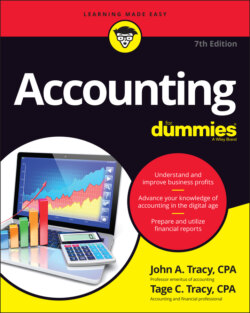Читать книгу Accounting For Dummies - John A. Tracy - Страница 19
Seeing accounting at work
ОглавлениеAccounting methods must fit the nature of the entity being accounted for and how the entity carries out its purpose. Accounting is not a case of one size fits all. Here’s a quick sweep of the radar screen to give you an idea of different types of entities that accounting methods are adapted to:
Accounting for profit-motivated businesses and accounting for nonprofit organizations (such as hospitals, homeowners’ associations, churches, credit unions, and colleges)
Income tax accounting while you’re living and estate tax accounting after you die
Accounting for farmers who grow their products, accounting for miners who extract their products from the earth, accounting for producers who manufacture products, and accounting for retailers who sell products that others make
Accounting for businesses and professional firms that sell services rather than products, such as the entertainment, transportation, and healthcare industries
Accounting where periodic financial statements are legally mandated (public companies are the primary example) and accounting where such formal accounting reports are not legally required
Accounting that mainly adheres to historical cost (businesses) and accounting that records changes in market value (mutual funds, for example)
Accounting in the private sector of the economy and accounting in the public (government) sector
Accounting for going-concern businesses that will be around for some time and accounting for businesses in bankruptcy that may not be around tomorrow
Accounting is necessary in a free-market capitalist economic system. It’s equally necessary in a centralized, government-controlled socialist economic system. All economic activity requires information. The more developed the economic system, the more the system depends on information. Much of the information comes from the accounting systems used by the businesses, institutions, individuals, and other players in the economic system.
Some of the earliest records of history are the accounts of wealth and trading activity. The need for accounting information was a main incentive in the development of the number system we use today. The history of accounting is quite interesting (but beyond the scope of this book).
